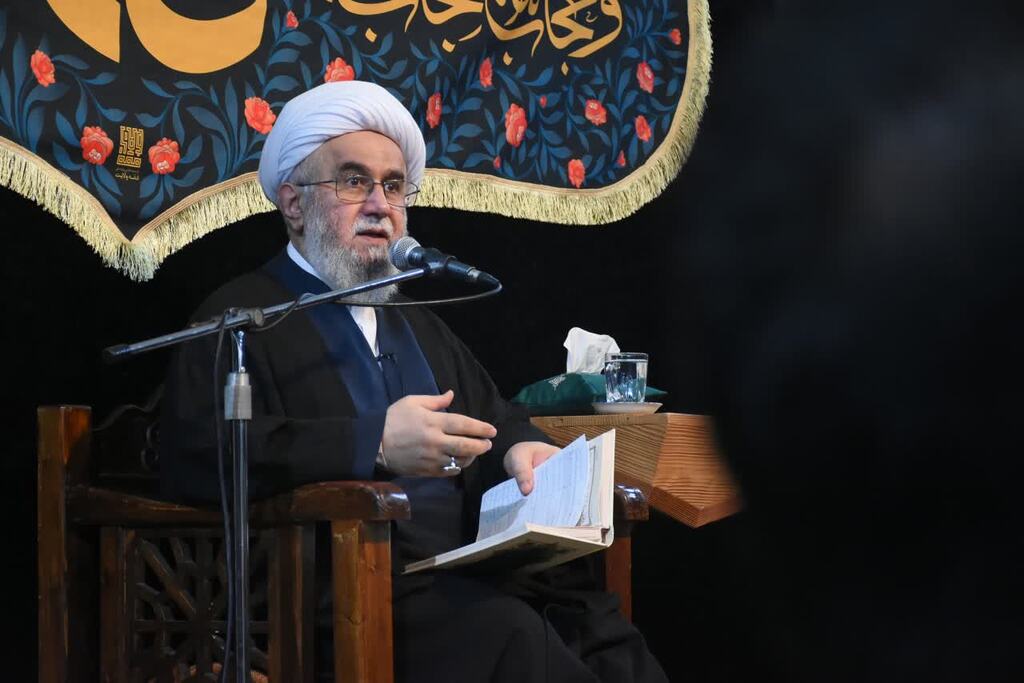Women, Men Originate from the Same Essence/ Women Can Serve as Spiritual Role Models: Ayatollah Ramazani
The Secretary-General of the AhlulBayt (a.s.) World Assembly, referencing Quranic verses, stated that men and women share the same essence, with no difference in their human value. He emphasized that women have the capacity to attain infallibility and act as spiritual role models in society.
ABWA Official Website – On Wednesday evening, December 4, 2024, during a ceremony commemorating the martyrdom anniversary of Lady Fatimah al-Zahra (a.s.) at Haj Samad Khan Mosque in Rasht, Ayatollah Reza Ramazani remarked, “In the Jahiliyyah (the era of ignorance in pre-Islamic Arabia), there existed a narrow and limited perspective towards women, denying them any defined status. On the other hand, an unrestrained perspective arose, granting women absolute freedom from all directions. Both views are deviant interpretations of the nature of women.”

Pointing out that “without considering the spiritual and emotional aspects of human beings, it is impossible to provide an accurate understanding of humanity,” the Secretary-General of the AhlulBayt (a.s.) World Assembly stated, “Equality in women’s rights means recognizing that men and women share the same essence. The essence of women is identical to that of men, rooted in their souls and spirits.”
“If society upholds its boundaries, it will undoubtedly advance. God created men and women from the same essence, with no differences. The true essence of humanity lies in the soul, while the body is merely a tool. Human faculties must also be properly managed,” he added.
Emphasizing that the faith, piety, and dignity mentioned in the Quran apply equally to men and women, Ayatollah Ramazani affirmed, “A woman can achieve infallibility and spiritual authority, like Lady Fatimah al-Zahra (a.s.), who communicated with divine angels and was thus called Muhaddithah.”
“Women can serve as role models for men. They must recognize their greatness and strive for self-elevation,” he continued.
The representative of the people of Gilan in the Assembly of Leadership Experts clarified that differences between men and women in creation are not discriminatory. “In essence and spiritual growth, women are no different from men. In worship and perfection, women can progress to the same level as men, if not higher,” he noted.
“In women, the path of the heart, which is one of the most effective routes to spirituality, is often more than in men. The differences between men and women complement each other, creating a mutual dependence in society,” he further explained.
Ayatollah Ramazani remarked that anyone who has piety will achieve greater growth, adding, “The fact that women do not lead prayers in mosques does not imply their inferiority to men.”
The Secretary-General of the AhlulBayt (p.b.u.h) World Assembly stressed that God Almighty granted Lady Fatimah al-Zahra (a.s.) the role of Shifa’a (Intercession).
On the issue of inheritance, he stated, “The share allocated to women is less than that of men because the financial responsibilities of the family rest primarily on men.”
“Women have the responsibility of nurturing children, and motherhood is not a minor task. Without this role, families cannot be properly nurtured. Men, in addition to economic responsibilities, also bring moral guidance to the family,” he further noted.
Ayatollah Ramazani asserted that Lady Fatimah (a.s.) was a complete and comprehensive figure in the true sense of the word. “We have achieved the misconception that a woman’s role is limited to staying at home and working there. However, women should be proactive and participate in fields like medicine and education,” he added.
The member of the Assembly of Leadership Experts concluded by highlighting the need to create opportunities for the growth and responsibilities of women and girls. “These capacities can lead society toward civilization. Women can attain the highest levels of faith and moral development.”
**************
End/ 345
The Secretary-General of the AhlulBayt (a.s.) World Assembly, referencing Quranic verses, stated that men and women share the same essence, with no difference in their human value. He emphasized that women have the capacity to attain infallibility and act as spiritual role models in society.
ABWA Official Website – On Wednesday evening, December 4, 2024, during a ceremony commemorating the martyrdom anniversary of Lady Fatimah al-Zahra (a.s.) at Haj Samad Khan Mosque in Rasht, Ayatollah Reza Ramazani remarked, “In the Jahiliyyah (the era of ignorance in pre-Islamic Arabia), there existed a narrow and limited perspective towards women, denying them any defined status. On the other hand, an unrestrained perspective arose, granting women absolute freedom from all directions. Both views are deviant interpretations of the nature of women.”

Pointing out that “without considering the spiritual and emotional aspects of human beings, it is impossible to provide an accurate understanding of humanity,” the Secretary-General of the AhlulBayt (a.s.) World Assembly stated, “Equality in women’s rights means recognizing that men and women share the same essence. The essence of women is identical to that of men, rooted in their souls and spirits.”
“If society upholds its boundaries, it will undoubtedly advance. God created men and women from the same essence, with no differences. The true essence of humanity lies in the soul, while the body is merely a tool. Human faculties must also be properly managed,” he added.
Emphasizing that the faith, piety, and dignity mentioned in the Quran apply equally to men and women, Ayatollah Ramazani affirmed, “A woman can achieve infallibility and spiritual authority, like Lady Fatimah al-Zahra (a.s.), who communicated with divine angels and was thus called Muhaddithah.”
“Women can serve as role models for men. They must recognize their greatness and strive for self-elevation,” he continued.
The representative of the people of Gilan in the Assembly of Leadership Experts clarified that differences between men and women in creation are not discriminatory. “In essence and spiritual growth, women are no different from men. In worship and perfection, women can progress to the same level as men, if not higher,” he noted.
“In women, the path of the heart, which is one of the most effective routes to spirituality, is often more than in men. The differences between men and women complement each other, creating a mutual dependence in society,” he further explained.
Ayatollah Ramazani remarked that anyone who has piety will achieve greater growth, adding, “The fact that women do not lead prayers in mosques does not imply their inferiority to men.”
The Secretary-General of the AhlulBayt (p.b.u.h) World Assembly stressed that God Almighty granted Lady Fatimah al-Zahra (a.s.) the role of Shifa’a (Intercession).
On the issue of inheritance, he stated, “The share allocated to women is less than that of men because the financial responsibilities of the family rest primarily on men.”
“Women have the responsibility of nurturing children, and motherhood is not a minor task. Without this role, families cannot be properly nurtured. Men, in addition to economic responsibilities, also bring moral guidance to the family,” he further noted.
Ayatollah Ramazani asserted that Lady Fatimah (a.s.) was a complete and comprehensive figure in the true sense of the word. “We have achieved the misconception that a woman’s role is limited to staying at home and working there. However, women should be proactive and participate in fields like medicine and education,” he added.
The member of the Assembly of Leadership Experts concluded by highlighting the need to create opportunities for the growth and responsibilities of women and girls. “These capacities can lead society toward civilization. Women can attain the highest levels of faith and moral development.”
**************
End/ 345





